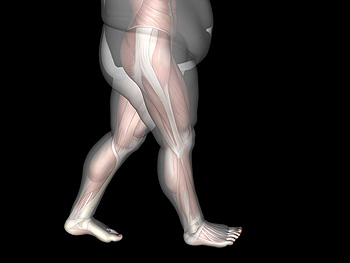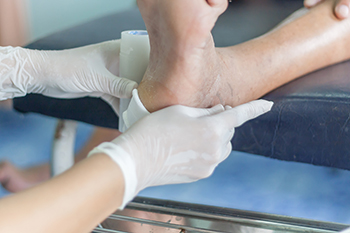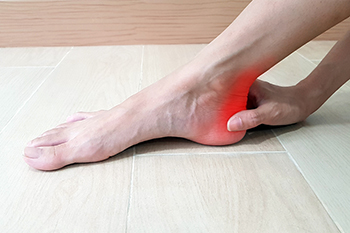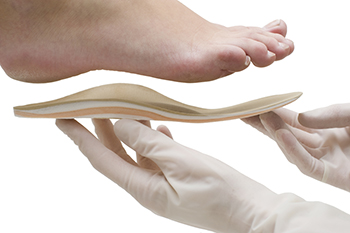Connect With Us
Blog
Items filtered by date: June 2023
Excessive Weight May Cause Foot Conditions

Research has indicated that the number of people who are obese has doubled across the globe in the last forty years, and being overweight often affects foot health. This can be a result of the added weight the feet must support, and daily activities may be difficult to complete. Higher body mass index may lead to developing certain foot conditions that can include plantar fasciitis, heel spurs, and Achilles tendon injuries. Overweight people can walk slower and have shorter stride lengths. Stress may be increased on the soft tissues and joints, which may lead to developing overuse injuries. Additionally, the ankles may lose strength from carrying the extra weight. Flat feet may develop for the same reason, and this can be another reason to lose excess weight. As this is being accomplished, it may be easier to build strength in the intrinsic muscles that can help to stabilize the arches. If you are overweight and have foot problems, it is suggested that you confer with a podiatrist who can help you to manage this condition.
The more you weigh, the harder your feet must work to support your body. If you’re an obese individual and are concerned about your feet, contact Dr. Richard Silverstein from Union Foot Care. Our doctor can provide the care you need to keep you pain-free and on your feet.
Obesity and Your Feet
People who are overweight are putting more pressure on their ankles, knees, and hips as well as their feet. This unfortunately can lead to variety of different issues.
Problems & Complications Stemming from Obesity
- When the body is overweight, it tries to compensate by changing the way that it moves. An obese person may lean forward and put extra weight on the wrong part of the foot. This puts unnecessary stress on the feet.
- Obese people are also more likely to develop type II diabetes which is a condition that causes a lot of foot problems. People with diabetes often don’t feel the cuts and sores that they may have on their feet, which can lead to more complicated and severe issues.
- Plantar fasciitis is another foot condition that can be caused by obesity. Plantar fasciitis is an inflammation of the tissue along the bottom of the foot, which causes pain and stiffness while walking and climbing stairs.
If you have any questions, please feel free to contact our office located in Havre de Grace, MD . We offer the newest diagnostic and treatment technologies for all your foot care needs.
A Puncture Wound on the Foot

A puncture wound can be a small hole in the foot that can be caused by stepping on a sharp, pointed object. It often produces discomfort, and the foot can also become bruised and swollen. Additionally, some patients have difficulty moving the affected area, and it is beneficial to seek medical attention. An animal bite also may cause a puncture wound, and an X-ray may be taken that can determine the depth of the wound. It is important that the wound is properly cleaned, and this can begin with removing existing dirt and debris. This can be followed by applying medicine to the wound, which may help to prevent a bacterial infection. Symptoms may be managed by frequently elevating the foot and keeping it above heart level. This is often effective in reducing swelling and pain that may be present. If you have additional questions about how to perform proper wound care for the foot, it is suggested that you ask a podiatrist who can help you with useful information.
Wound care is an important part in dealing with diabetes. If you have diabetes and a foot wound or would like more information about wound care for diabetics, consult with Dr. Richard Silverstein from Union Foot Care. Our doctor will assess your condition and provide you with quality foot and ankle treatment.
What Is Wound Care?
Wound care is the practice of taking proper care of a wound. This can range from the smallest to the largest of wounds. While everyone can benefit from proper wound care, it is much more important for diabetics. Diabetics often suffer from poor blood circulation which causes wounds to heal much slower than they would in a non-diabetic.
What Is the Importance of Wound Care?
While it may not seem apparent with small ulcers on the foot, for diabetics, any size ulcer can become infected. Diabetics often also suffer from neuropathy, or nerve loss. This means they might not even feel when they have an ulcer on their foot. If the wound becomes severely infected, amputation may be necessary. Therefore, it is of the upmost importance to properly care for any and all foot wounds.
How to Care for Wounds
The best way to care for foot wounds is to prevent them. For diabetics, this means daily inspections of the feet for any signs of abnormalities or ulcers. It is also recommended to see a podiatrist several times a year for a foot inspection. If you do have an ulcer, run the wound under water to clear dirt from the wound; then apply antibiotic ointment to the wound and cover with a bandage. Bandages should be changed daily and keeping pressure off the wound is smart. It is advised to see a podiatrist, who can keep an eye on it.
If you have any questions, please feel free to contact our office located in Havre de Grace, MD . We offer the newest diagnostic and treatment technologies for all your foot care needs.
Causes of Achilles Tendon Pain

The strong band of tissue that runs from the calf muscles to the heel bone is known as the Achilles tendon. When this tendon is overused, which is frequent among runners, dancers, and other athletes, it can become inflamed and extremely painful. This condition is called Achilles tendinopathy. The top cause of Achilles tendinopathy is overuse, which tears or stretches the tendon and causes inflammation. Other causes include certain types of arthritis, flat feet, and overpronation. In addition, wearing shoes that lack adequate support, being overweight, and taking certain antibiotics may increase the likelihood of developing Achilles tendinopathy. There are a number of treatments available for Achilles tendinopathy, but healing time depends on the severity of the injury. In some cases, surgery is required. There are several ways to prevent tendinopathy, including stretching exercises and warmup and cool-down routines. Wearing proper footwear is another way to help prevent this injury. For more information, it is suggested that you consult a podiatrist.
Achilles tendon injuries need immediate attention to avoid future complications. If you have any concerns, contact Dr. Richard Silverstein of Union Foot Care. Our doctor can provide the care you need to keep you pain-free and on your feet.
What Is the Achilles Tendon?
The Achilles tendon is a tendon that connects the lower leg muscles and calf to the heel of the foot. It is the strongest tendon in the human body and is essential for making movement possible. Because this tendon is such an integral part of the body, any injuries to it can create immense difficulties and should immediately be presented to a doctor.
What Are the Symptoms of an Achilles Tendon Injury?
There are various types of injuries that can affect the Achilles tendon. The two most common injuries are Achilles tendinitis and ruptures of the tendon.
Achilles Tendinitis Symptoms
- Inflammation
- Dull to severe pain
- Increased blood flow to the tendon
- Thickening of the tendon
Rupture Symptoms
- Extreme pain and swelling in the foot
- Total immobility
Treatment and Prevention
Achilles tendon injuries are diagnosed by a thorough physical evaluation, which can include an MRI. Treatment involves rest, physical therapy, and in some cases, surgery. However, various preventative measures can be taken to avoid these injuries, such as:
- Thorough stretching of the tendon before and after exercise
- Strengthening exercises like calf raises, squats, leg curls, leg extensions, leg raises, lunges, and leg presses
If you have any questions please feel free to contact our office located in Havre de Grace, MD . We offer the newest diagnostic tools and technology to treat your foot and ankle needs.
Why Live with Pain and Numbness in Your Feet?
Advantages of Custom Orthotics

If you regularly suffer from foot pain, it is beneficial to spend some time investigating the best type of insoles, which are also referred to as orthotics, to address the situation. Foot pain can have many causes, so the first order of business is to determine the source of discomfort. Many people with plantar fasciitis, metatarsalgia, bunions, or flat feet are candidates for shoe inserts, which are premade, one-size-fits-all types. Custom orthotics, however, are produced from a mold of your feet and designed to address the specific foot problem you have. While store-bought inserts are less expensive, a custom orthotic is well worth the extra cost. In addition, because the custom orthotic fits your foot perfectly, it also feels comfortable inside your shoe. Finally, a premade orthotic insert may change your gait and do more harm than good. For help with finding the right orthotics for your feet, it is suggested that you make an appointment with a podiatrist for a thorough examination of your foot problem.
If you are having discomfort in your feet and would like to try orthotics, contact Dr. Richard Silverstein from Union Foot Care. Our doctor can provide the care you need to keep you pain-free and on your feet.
What Are Orthotics?
Orthotics are inserts you can place into your shoes to help with a variety of foot problems such as flat feet or foot pain. Orthotics provide relief and comfort for minor foot and heel pain but can’t correct serious biomechanical problems in your feet.
Over-the-Counter Inserts
Orthotics come in a wide variety of over-the-counter inserts that are used to treat foot pain, heel pain, and minor problems. For example, arch supports can be inserted into your shoes to help correct overarched or flat feet, while gel insoles are often used because they provide comfort and relief from foot and heel pain by alleviating pressure.
Prescription Orthotics
If over-the-counter inserts don’t work for you or if you have a more severe foot concern, it is possible to have your podiatrist prescribe custom orthotics. These high-quality inserts are designed to treat problems such as abnormal motion, plantar fasciitis, and severe forms of heel pain. They can even be used to help patients suffering from diabetes by treating foot ulcers and painful calluses and are usually molded to your feet individually, which allows them to provide full support and comfort.
If you are experiencing minor to severe foot or heel pain, it’s recommended to speak with your podiatrist about the possibilities of using orthotics. A podiatrist can determine which type of orthotic is right for you and allow you to take the first steps towards being pain-free.
If you have any questions please contact our office located in Havre de Grace, MD . We offer the newest diagnostic and treatment technologies for all your foot and ankle needs.
Blog Archives
- October 2024
- September 2024
- August 2024
- July 2024
- June 2024
- May 2024
- April 2024
- March 2024
- February 2024
- January 2024
- December 2023
- November 2023
- October 2023
- September 2023
- August 2023
- July 2023
- June 2023
- May 2023
- April 2023
- March 2023
- February 2023
- January 2023
- December 2022
- November 2022
- October 2022
- September 2022
- August 2022
- July 2022
- June 2022
- May 2022
- April 2022
- March 2022
- February 2022
- January 2022
- December 2021
- November 2021
- October 2021
- September 2021
- August 2021
- July 2021
- June 2021
- May 2021
- April 2021
- March 2021
- February 2021
- January 2021
- December 2020
- November 2020
- October 2020
- September 2020
- August 2020
- July 2020
- June 2020
- May 2020
- April 2020
- March 2020
- February 2020
- January 2020
- December 2019
- November 2019
- October 2019
- September 2019
- August 2019
- July 2019
- June 2019
- May 2019
- April 2019
- March 2019
- February 2019
- January 2019
- December 2018
- November 2018
- October 2018
- September 2018
- August 2018
- July 2018
- June 2018
- May 2018
- April 2018
- March 2018
- February 2018
- January 2018
- December 2017
- November 2017
- October 2017
- September 2017
- August 2017
- July 2017
- June 2017
- May 2017
- April 2017
- March 2017
- February 2017
- January 2017
- December 2016
- November 2016
- October 2016
- September 2016
- August 2016
- July 2016
- June 2016
- May 2016

